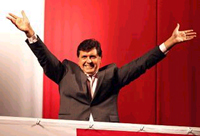Peru’s Alan Garcia to boost moderate left in South America
The Socialdemocratic president-elect takes office on Friday

As he prepares to inugurate his second presidency on Friday, Peru’s Social democratic leader Alan Garcia has anticipated the guidelines of his government, which is expected to follow the example of the modern European center-left administrations. With the above in mind, Alan Garcia will surely develop a close relationship with his moderate neighbours in Brazil, Chile and Uruguay, while keeping distance from nationalistic leaders in Venezuela and Bolivia.
“I am not a dictator as (the former Nicaraguan president, Anastasio) Somoza and (the Dominican strongman, Rafael) Trujillo”, told Garcia in TV interview aired this week, but his remarks may have not just an historical reading. The president-elect is trying to convince local markets that he has learned the lessons of his previous turn, which ended under the shadows of hyperinflation and social unrest.
In his attempt to ease feasible tensions with the business sector, Garcia named ex-Deputy Finance Minister Luis Carranza as finance chief. Carranza, a former executive at Bilbao, Spain-based Banco Bilbao Vizcaya Argentaria, was a central bank director and deputy finance chief from August 2004 to August 2005.
As Bloomberg agency quotes, Mr. Carranza oversaw Peru's sale of $1.5 billion in bonds for early repayment of part of the country's debt with the Paris Club, a group of creditor nations including France, Canada, Germany and Italy. Garcia also appointed veteran diplomat Jose Garcia Belaunde as foreign minister. During his 35-year career, Garcia Belaunde served in Washington, the UN, Paris and Madrid.
But Garcia is also trying to situate himself in the current shaky South American scenario, strained since the irruption of Hugo Chavez as a wealthy radical regional leader. Chavez openly supported Garcia’s opponent in the runoff of the Peruvian presidential race, the nationalistic leader, Ollanta Humala, which lead to a strong verbal exchange between the Venezuelan president and the then-Social democratic candidate. The incident had diplomatic consequences, as both countries decided to request their ambassadors from each other capitals, keeping only low-ranked missions.
Alan Garcia’s APRA party controls roughly one third of the National Congress. Analysts believe that the new president will face serious problems to pass bills, as Humala’s nationalistic coalition is the first minority there with 45 out of 120 lawmakers. No matter the case, the incumbent Congress has already done a key job by ratifying a free trade agreement with the USA, which Garcia has promised to review once in office.
The deal was angrily questioned by Humala as a progress of the US imperialism into the country’s economy. During the campaign, Garcia asked for amendments to the pact, but the APRA lawmakers voted the original wording sent to the Congress by the incumbent President Alejandro Toledo.
Humala said that he will lead a crusade against the free trade deal. The issue is expected to be Garcia’s main challenge during his first weeks in power.
Hernan Etchaleco
Pravda.Ru
Discuss this article on Pravda.Ru English Forum
Subscribe to Pravda.Ru Telegram channel, Facebook, RSS!





